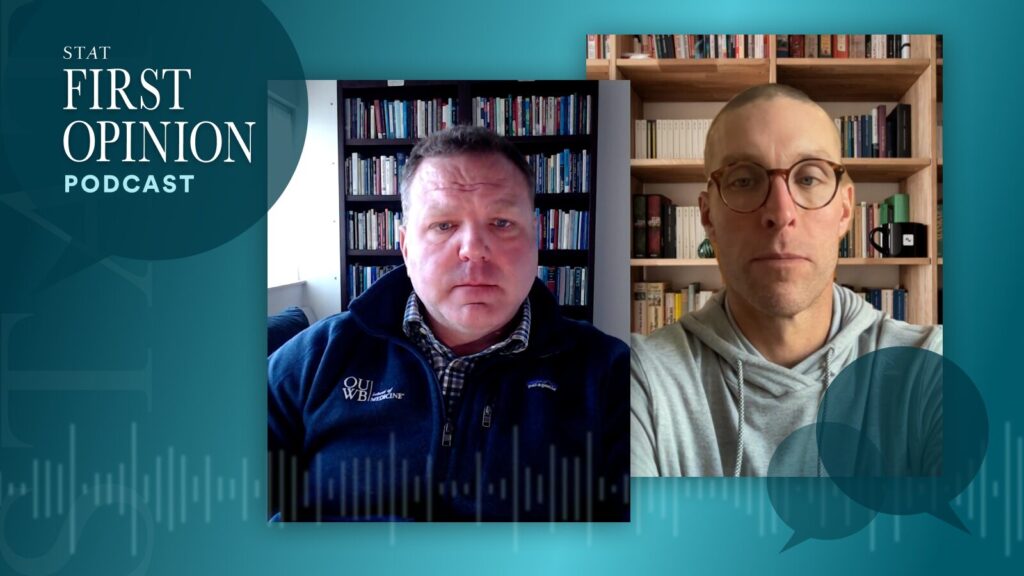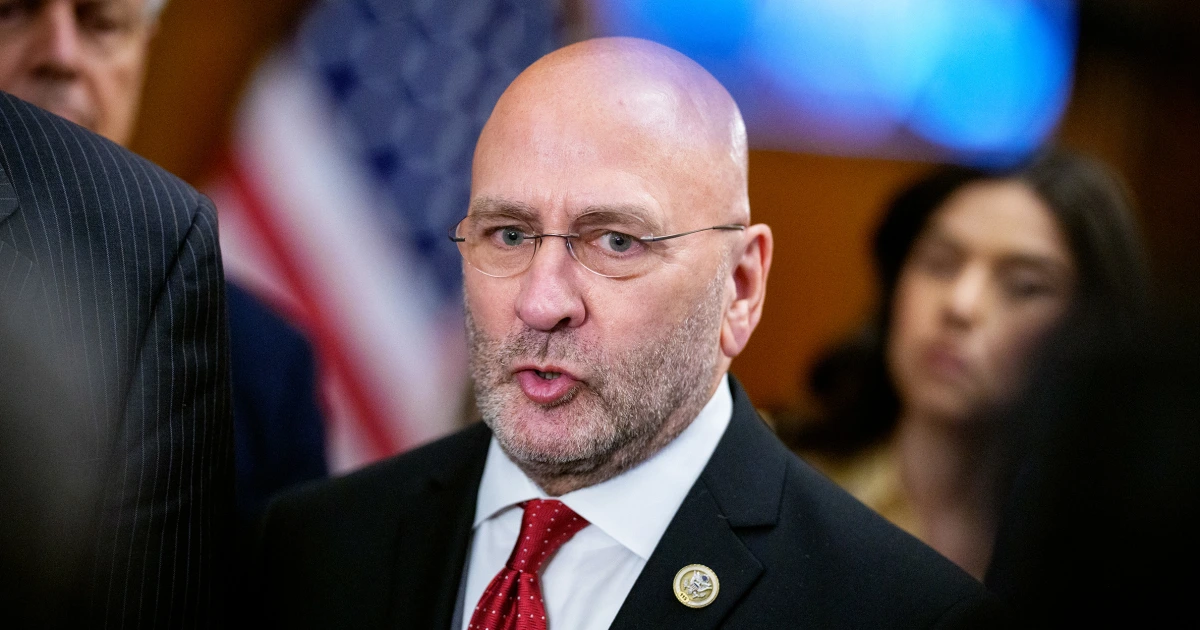Copyright STAT

Below is a lightly edited, AI-generated transcript of the “First Opinion Podcast” interview with Jason Wasserman and Parker Crutchfield. Be sure to sign up for the weekly “First Opinion Podcast” on Apple Podcasts, Spotify, or wherever you get your podcasts. Get alerts about each new episode by signing up for the “First Opinion Podcast” newsletter. And don’t forget to sign up for the First Opinion newsletter, delivered every Sunday. Torie Bosch: CPR can be much more brutal than it looks on TV and in movies. Ribs get cracked, lungs might get punctured, and the patient may not survive anyway. What’s a doctor to do when they know CPR might only prolong suffering? Advertisement Welcome to the First Opinion Podcast. I’m Torie Bosch, editor of First Opinion. First Opinion is STAT’s home for big, bold ideas from health care providers, researchers, patients, and others who have something to say about medicine’s most important and interesting topics. Today, we’re doing something a little different on the show. My colleague Alex Hogan is the host of a fantastic new weekly STAT video series called the STATus Report. This week, the STATus Report features an interview with Jason Wasserman and Parker Crutchfield about a controversial idea: that sometimes health care workers should fake CPR. Advertisement Jason is a dean’s distinguished professor in the Department of Foundational Medical Studies and the Department of Pediatrics at Oakland University, William Beaumont School of Medicine. Parker Crutchfield is professor in the Department of Medical Ethics, Humanities, and Law at Western Michigan University Homer Stryker M.D. School of Medicine. The two recently wrote a provocative First Opinion essay on what they call the slow code: when physicians, nurses, and other health care workers just go through the motions of CPR because they know a patient won’t survive. On the podcast today, you’ll hear an extended version of Alex’s conversation with Jason and Parker. After the break, Alex will take it away. Alex Hogan: Parker and Jason, thanks so much. Jason Wasserman: Well, thanks for having us. Hogan: So for starters, could you [explain] what a slow code is? Wasserman: Sure. So we use the term “slow code” as a sort of umbrella term as many people do for any insincere attempt at resuscitation where there’s some kind of deception, usually because the health care team doesn’t want to or doesn’t think it’s best to actually resuscitate the patient, but doesn’t feel like they can just refuse to make, or ostensibly make, an attempt now more technically. There are a variety of terms that are more specific that cover different types of insincere efforts at resuscitation. So “slow code” more specifically often refers to instances where a health care team takes its time getting there for the reason of not really wanting to resuscitate a patient. Whereas a term like “show code” or “Hollywood code” refers to something that happens during the code attempt that’s purely performative. Where, for example, chest compressions aren’t as deep as they should be or something like that. And then there’s a range of other kind of terms that call out different motivations or different aspects of a deceptive or insincere code attempt. And those are actually covered really well by Erica Andrist and her colleagues in our special issue in the journal Bioethics. Advertisement Hogan: What are some ways that a doctor can pretend to do CPR? Parker Crutchfield: They could compress the chest, not as deeply, using less force. They could just walk to the room more slowly, walk rather than run. They could decline or withhold certain parts of the code response. I know Jason has an anecdote of hearing someone, of injecting the epinephrine into the mattress rather than the human. One way to … try to get around doing a slow code is what’s called a short code or a time limited code or whatever it is. But it’s just like you’re using all the force and speed that you normally would, but doing it for a very short amount of time. And we think that might be under the umbrella of slow code. Other people think that it’s a way to not do a slow code, but also not provide inappropriate CPR. Hogan: If they perform CPR for a shorter amount of time than they otherwise would, do they just kind of say, “oh, I’m sorry, we lost them” basically? Crutchfield: I think it’s more of a way of self-justifying that they made an honest attempt, but also it allows them to tell the family, “yes, we did everything we could,” which is often what the family really wants, is just to hear that we did what we could. For any length of CPR, it’s always at the physician’s discretion when to start it and when to stop it. So that is entirely a clinical judgment. Wasserman: One of the reactions we’ve gotten to our special issue and our individual papers within it about the potential ethical permissibility of slow codes is we’ve heard a lot of physicians say, “I think that’s the wrong approach. What you should instead do is a short code or a time-limited code.” And the way they describe that is a sincere and vigorous CPR attempt, but which is short in duration. Our argument would be if there’s genuine uncertainty about the therapeutic justification for CPR, then it’s perfectly reasonable to attempt it. But if you’re doing it just to appease a family in the context of CPR that you believe is futile or medically inappropriate, then there’s really nothing sincere about it. And it’s actually not then a way around the slow code itself. Advertisement Crutchfield: It might be the worst option because you still inflict all of the harms upon the patient or at least many of the harms. Hogan: Do you think that CPR is widely misunderstood? Wasserman: Yeah, for sure. So, you know, CPR, arguably, looking back into the history of it, CPR was never intended to be an intervention deployed for all patients at the end of life, for all patient whose cardiopulmonary functions stopped. And the statistics on it are just really bad. I mean, depending on what study you look at, it’s far less than 50% and in some contexts below 25% of people that survived the discharge following a CPR attempt. For patients at the end of life with multiple comorbidities and frailties, the statistics are way worse than that. The problem is that CPR has been represented in the media and TV shows and all of these other places as a relatively innocuous intervention with high rates of success from which people recover with little problem. People watch a lifeguard resuscitate a patient on the beach and they kind of pop up and they go out to have dinner that night and that’s not actually what it’s like, but that causes people to demand it at a rate that far surpasses its actual efficacy. Hogan: Even when done correctly, CPR is pretty brutal. Is that right? Crutchfield: It’s brutal when it begins, and the harms to the patient aggregate. Hogan: So in the best case scenario that this is a successful CPR, what kind of injuries could someone sustain? They could be left worse off, how so? Wasserman: Well, so, frequently we see cracked ribs, also punctured lungs. And then it’s also important to remember that just because someone is under compressions doesn’t mean that their brain is getting oxygen at the typical rate. So while under CPR, they’re still experiencing some anoxia, they tend to experience brain damage even with prolonged CPR, even if it’s initiated quickly after a rest. Crutchfield: There are sort of the physical harms, but there’s the experience of it, you know, it’s going to be painful. It’s going to very unpleasant. And although some people, many of them who are receiving CPR will be unconscious and not experiencing the pain that in some cases, it is a small percentage, but enough to take notice of the act of receiving CPR could make them conscious. So a lot of people might say, well, there’s really no harm to the patient. That’s not true because it does harm them physically. And even if they are unconscious, there’s still a decent enough chance that they will experience the pain because CPR will make them conscious of it. Advertisement Wasserman: And then I would just also add that, and not everyone agrees about the nature of harms, beyond the physical or material harms that can be associated with CPR, we can think about what we might call dignitary harms, just harms of disrespect to the person and to the body. And I think these are especially poignant when we’re talking about futile or medically inappropriate CPR that we’re doing. Merely because families or surrogates have requested it, when we do that, and this is also comes out in one of the articles in our special issue. When we do, that we effectively use the patient as a means to satisfying concerns, grief, whatever it might be of the family. And that’s a dignitary harm. Hogan: At first glance, the idea that a physician would fake CPR is a pretty shocking thing, right? In your First Opinion, there’s a line that says, “We’re convinced that slow codes are not only ethical in some circumstances, they might be essential in today’s conflict-ridden medical landscape.” Can you explain how you came to that conclusion? Wasserman: So, a few things to note there. First, one of the reasons that we were motivated to do this special issue and to take up this topic was that for the past 40 years, the bioethics, medical ethics literature has kind of been very dogmatic and there’s been really no room for the idea that slow codes could be ethically permissible under any conditions. They were sort of universally decried in the literature with only one exception. In 2011, John Lantos and Bill Meadow put out a piece that has a sort of narrow sliver of an exception. All 13 commentaries on that piece said, “no, they’re wrong” in one way, shape, or form. And so it’s as close to a dogma as you can get in bioethics and medical ethics. And at the same time in 2021, Gina Piscitello and colleagues did an empirical study. They found that 69% of surveyed clinicians report that a slow code had been performed on a patient under their care at some point. Over half of them had seen one in the last year and over half of the ICU physicians and nurses believe they could be ethical in some circumstances. Advertisement Now what that sets up for us is the idea that the view from the academy is very different than the view on the ground. And we were interested in unpacking that. And I think what’s happening in large part is that when it comes to conflicts with families, particularly in the litigious climate of critical care that physicians face every day, particularly in context of legislative statutes that require consent for [do not resuscitate orders] or otherwise stack the deck in favor of families or surrogates, even when they’re requesting futile and inappropriate care. And in the context of probate judges that sometimes issue such orders, it sets up a situation in which physicians sometimes can’t practice good medicine. And in that context of that conflict, it seems like there may be some room for slow codes as a potentially ethical practice. The way I would also put it is, everybody would love for a world in which they were unnecessary, but in order to do that, we have to further empower clinician judgment and expertise in ways that I don’t see happening in the legislative and judicial landscape especially right now and so in that non-ideal context I think that there’s at least some room for discussion about [it]. Hogan: What is it about today’s landscape? Has something changed? Wasserman: I think one thing we’re seeing is increasing deference to pluralistic views about health and medicine and a decreased respect for clinical expertise. You know, this was kind of under a spotlight during the pandemic when a whole host of unproven and even disproven therapies were demanded. People across the country at different health systems, including myself, had to go to court to sort of fend off family demands. Judges were sometimes sympathetic, or at least issued temporary restraining orders against different institutions while things were sorted out. And I think if you look, especially at the federal government right now and things that are happening at Health and Human Services, I think that the tides are moving against respect for clinical judgment and expertise and toward greater deference to patients and families. And in some respects, that’s good and because we do wanna honor the values and preferences of patients and families, but we don’t wanna do it in ways that are not evidenced and that cut against clear clinical judgment. Look, critical care is riddled with uncertainty and we should be deferential in the context of uncertainty, but that doesn’t mean that all decisions and prognoses are uncertain in ways that justify any intervention and we need to draw some lines. Advertisement Hogan: The slow code obviously isn’t taught in medical school. So how do medical workers learn about it? How do they learn to use it? Crutchfield: Well, there are a whole bunch of practices and attitudes and customs that are taught in a hidden curriculum. They will learn them simply by observing the trainers do them, or they will try something out and the attending physician will fail to reprimand or condemn, which is sort of like a tacit endorsement of what they’ve done. Wasserman: And just to pick up on that, you know, I don’t teach that slow codes are permissible, quite clearly the consensus opinion is that they’re impermissible, that they are likely illegal in most places. And I want to make that really clear. I know I don’t recommend them when I do ethics consults at the hospital. But when I analyze the issue, because of all the factors that we’ve described, we ought to be having the discussion, at least academically for now. But to Parker’s point, when we teach the consensus and test on the consensus and reflect the consensus, that is a set of general guidances that is in some ways naturally detached from the nuances of what’s happening on the ground. And I think that’s where people learn about slow codes, where the empirical realities that people in critical care live with every day kind of grow up and fill in the gaps between the rules. And so they learn that it has become a necessity of critical care, because the consensus positions and principles don’t cover certain situations or don’t well enough in ways that prevent moral distress and prevent even unethical intervention. I’ll say also a story from a colleague of mine from when he was in medical school, is his first night on a critical care unit and code blue went off and he comes running out of the room, running down the hall, hits the doorway to the stairwell and as just as he’s about to do that, he looks over and he sees his attending physician, like hitting the elevator button and reading a magazine and waiting, and it was like, “Oh, so we’re not all rushing to this.” And it communicated information to him about what was happening that can’t be communicated didactically. Advertisement Hogan: Did you say that, that they’re, some places, illegal? Wasserman: Yeah, I think they’re deceptive. They’re probably illegal everywhere. I mean, it’s a form of lying. Hogan: Yeah, which makes all the sense in the world, but it’s also like the judgment, there’s a certain amount of judgment involved. I didn’t realize there was a legal aspect to it, I guess. Crutchfield: So CPR is a billable procedure. At a minimum, if you do a slow code and bill for it, it’s fraud. Interesting. Hogan: In an ideal world, though, slow codes wouldn’t be a thing. So what can be done to make it so they’re utilized less? Crutchfield: I think that’s a very difficult question. So one way is for probate judges to be more standardized and less willing to intervene on clinical judgments. So there are very many fine probate judge who leave the medicine up to the doctors. There are other probate who do not. Slow code would be less necessary if there were probate judgment who intervened in medicine less. Doctors certainly don’t go around making legal judgments that carry the force of the state. Wasserman: After the special issue came out, after our op-ed on STAT came out, one of the reactions that we’ve gotten from physicians and this mirrors the broader literature on slow codes as well, is that, “Well, look, if we would just communicate the prognosis more clearly, if we communicate about the harms of CPR more clearly, if we were better communicators, then slow codes wouldn’t be unnecessary.” Also, people have said, “Well, if we would strengthen our non-beneficial care policies, change laws to enable clinical judgment to be authoritative in those situations, then we could just unilaterally refuse futile or medically inappropriate CPR with less risk. Then that would render them unnecessary.” I think both of those move the needle. We should communicate better and more clearly. We should communicate about the risks of CPR better and more clearly. We should strengthen our non-beneficial care policies. We should advocate for legislation that increases the authority of clinical judgment, particularly in the context of futile or inappropriate interventions. Advertisement I don’t think any of those are gonna do away with the conflict. And as long as we have the conflict and a litigious culture, we’re gonna have some sort of space in which these are gonna, I think, [show] up. Hogan: And you just touched on this, but again, your First Opinion piece went pretty viral actually and generated some pretty intense response from our readers at STAT. Among letter writers, we heard from some people, especially in the medical field, who strongly agreed with you guys. But we also heard from others that thought this line of thinking may undermine trust in physicians. What do you think about that response? Crutchfield: So the way trust develops and is undermined, it’s very unpredictable. One thing that’s always a red flag for me in any sort of argument is a prediction that something will undermine trust. Because, for example, lack of transparency. Well, it turns out there’s pretty good evidence from political science that transparency undermines trust. It can go either way. So it might undermine trust, but it also might not. It’s speculation at best. There’s no evidence to think that it would undermine trust. In fact, one of the articles in our special issue suggests the alternative, that actually it wouldn’t undermine trust and potentially would have no effect on how the public views of medicine. So I think we should be very skeptical of predictions of trust, not just here, but anywhere in public affairs. Wasserman: Yeah, I mean, to add to that a little, I mean I think that people are reacting to the deceptive aspects of a slow code when they predict that it will undermine trust. But to Parker’s point that it’s fairly unpredictable, let’s not forget that it it’s done in order to effectively take care of a grieving family and not exacerbate that in order mitigate harm to a patient. All of those motivations would have been know, predictably increased trust: “Oh, thank you. I appreciate that you care enough about me at the end of my life that you’re not going to do something you think is harmful to me.” That sounds like a great narrative to put forward. So, you know, in the end, I think, we have just as many reasons to think it would be received well as poorly, and we have some empirical evidence emerging in our special issue that that’s the case. Hogan: So both your First Opinion piece and your special issue of bioethics, the conversation it generated, particularly among doctors, do you think was productive? Crutchfield: I hope so. One thing that drew us to this topic in the first place was the fact that no one was talking about it. So there was a target article 10, 15 years ago, and then a bunch of OPCs and then nothing after that. And even really the scholarship prior to that was pretty minimal. So there is no conversation happening about this. And at the very least, our whole purpose here was to get some sort of conversation going, like, let’s not to say that they’re good or bad, or we should do them or shouldn’t should not do them. You know, not really to weigh in on the morality of them, though we do. It was to get people talking about them because they’re happening in this ambiguous moral space, but no one is talking about about them. So yes, I’m happy people are disagreeing, and I’m happier people are talking about them because prior to the special issue and the op-ed, no one was. Hogan: Lastly, I just always like to give it an opportunity if there’s anything you may think I missed or any other thing you’d like to add. Crutchfield: So one point that I think is important is we’re both clinical ethicists, so we both work at hospitals, but we’re also both academics and researchers. And so, yes, while we’re talking about these and trying to get a conversation going and join in that conversation, we are still sort of that aspect of the job is academic and it’s compartmentalized from our practice and the profession. Although we are having this conversation, we’re still doing it from the ivory tower of academics. Hopefully, it’s trickling down into the people who are actually running the codes. And I think it is. But we are not trying to promote the slow code. We’re trying to get people talking about it. Wasserman: I’ll just add that what I find really interesting about the conversation is that parties that disagree about this, the people that think so codes are impermissible and those who think that they make, they could be permissible under some circumstances are actually really close together in terms of what they value and what they care about. And to me, the fundamental difference between them is what we call an ideal and non-ideal ethics divide. In an ideal world, lying is wrong and we would just be always transparent. And I think we all agree with that. Like in an ideal word, there are some real serious moral pitfalls, at least associated with slow codes, but we don’t live in an ideal world. And so non-ideal ethics approach asks, how can we make the world we do live in a little less bad? And I that’s what the people who think that there may be some room for the permissibility of slow codes are really after. They don’t dispute that, you know, truth-telling is generally the right thing to do and that we ought to do a better job communicating with patients and we ought to strengthen and make more transparent or not beneficial care policies. I don’t know people that disagree with that. What I see is a bunch of people struggling on the ground with the non-ideal context in which they actually live every day and trying to make those a little better. I think we can all appreciate that we’re in a complex space in that regard, even if we disagree. And I think that underscores what Parker just said, that the conversation itself is what’s most important. Crutchfield: Some people might want to say, “Slow codes are never OK because I prioritize integrity.” And there’s not necessarily a loss of integrity when you do a slow code. In fact, it might actually promote integrity. So if someone’s integrity is constituted by their commitment to doing good, like producing benefits and producing good consequences. Doing a slow code, if it’s the choice that best promotes good things and such as pleasures and minimizes pains and harms, that might be the thing that does promote one’s own integrity. And so you might hear a lot of doctors say, “I have principles, I’ve integrity.” Well, that only means something if we know what those principles are and what constitutes a person’s integrity. It doesn’t mean that another person who operates according to a different set of moral ideals lacks integrity when they act in accordance with. Wasserman: The burden would be on people making those claims to prove that deception is always wrong. I mean, there are lots of situations in which we lie to family members. An abusive husband demands to know if his wife said anything about how she came in with broken ribs. And the physician goes out and says, “no, she said she fell,” even though she had reported the abuse. I don’t think anybody thinks that’s wrong. Yet it’s lying … You know, there’s deception across medicine and all sorts of different cases in service to the best interest of patients. The question is, you know, is this a legitimate form of that? And I think reasonable people can disagree, but I don’t think we get there by foreclosing on, you know all forms of deception because I think that’s unrealistic. Hogan: This has been a fascinating and illuminating conversation. Jason and Parker, thank you so much. Bosch: Hey, it’s Torie again. If you enjoyed this extended version of the STATus Report from Alex Hogan, you can find more on statnews.com or on STAT’s YouTube account. And thank you for listening to the First Opinion podcast. It’s produced by Hyacinth Empinado, Alissa Ambrose is the senior producer, and Rick Burke is the executive producer. You can share your opinion about First Opinion by emailing me at [email protected]. And please leave a review or rating on whatever platform you use to get your podcast. Until next time, I’m Torie Bosch, and please don’t keep your opinions to yourself.



